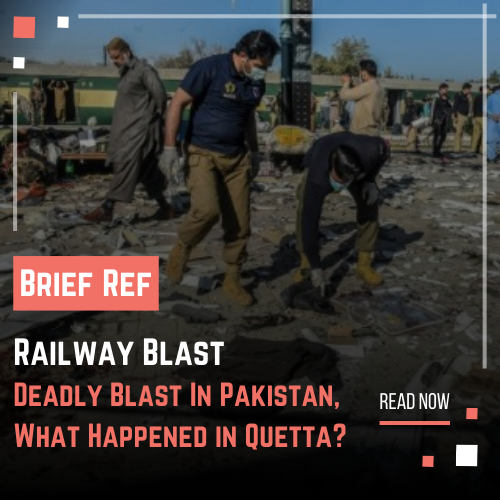What Happened in the Pakistan Railway Blast?
On a recent Saturday morning in Quetta, Balochistan, Pakistan, a tragic explosion occurred at a railway station, killing at least 25 people and injuring more than 50 others. The blast happened as a large crowd gathered to board the Jaffar Express, a popular train service from Quetta to Peshawar. According to local authorities, the explosion was confirmed as a suicide attack, with the attacker carrying 6-8 kg of explosives.
Who Claimed Responsibility?
The Balochistan Liberation Army (BLA), a separatist militant group active in the region, claimed responsibility for the attack. In a statement, the BLA indicated that their target was a military unit present at the station. This attack is part of a long-standing insurgency led by the BLA, which seeks greater autonomy and control over Balochistan’s natural resources, Pakistan Railway Blast.
Where Did the Blast Occur?
The explosion took place at Quetta’s main railway station around 9 a.m., an area typically bustling with civilians and security personnel. Approximately 200 people were on the platform at the time of the explosion. Videos from the scene show the chaos immediately after the blast, with injured individuals lying amidst debris as rescue teams arrived.
Why Did This Attack Occur?
The BLA has a history of violent acts to further its separatist agenda in Balochistan, a province rich in natural resources but facing economic struggles and low development levels. Balochistan’s strategic location bordering Iran and Afghanistan and its deep-water port at Gwadar have made it an area of geopolitical interest, especially since the port was leased to China as part of the Belt and Road Initiative.
This specific attack continues a pattern of violence aimed at undermining Pakistan’s security forces and destabilizing efforts in the province. In recent months, Balochistan has seen increased violence, with attacks targeting both civilians and security personnel.
Who Were the Victims of the Blast?
The explosion took the lives of both civilians and military personnel. Fourteen soldiers were among the dead, underscoring the targeted nature of the attack. Eyewitnesses described scenes of horror, with civilians and security officers lying injured and calling for help amid the aftermath. Many of the injured were taken to nearby hospitals, where local officials appealed for blood donations to assist those in critical condition, Pakistan Railway Blast.
What Was the Response from Pakistan’s Government?
Following the attack, Pakistan’s leaders strongly condemned the violence. Balochistan’s Chief Minister Sarfraz Bugti labeled the perpetrators as “enemies of humanity” and vowed that the government would bring them to justice. Prime Minister Shehbaz Sharif also condemned the blast, promising a comprehensive investigation and urging resilience in the face of terror. Interior Minister Mohsin Naqvi assured full support to the Balochistan government and emphasized that the federation would contribute to maintaining peace in the province.
Additionally, security measures were intensified throughout Quetta and the province, with gatherings temporarily banned and additional monitoring at public transportation hubs to prevent further incidents.
What Is the Impact of the Blast?
This tragic event has intensified concerns about security in Pakistan, particularly in Balochistan. The ongoing conflict has had significant effects on the local economy, discouraging investment and tourism, and creating a climate of fear for residents. The attack also raises questions about the safety of Pakistan’s infrastructure, particularly in areas vulnerable to militant attacks, Pakistan Railway Blast.
In the broader context, the blast serves as a reminder of the ongoing challenges in Balochistan, where separatist groups like the BLA continue to disrupt the province’s development. Pakistan’s partnerships with foreign investors, especially with China in developing the Gwadar port, are also affected, as instability could impact long-term investments and projects tied to the Belt and Road Initiative.
What’s Next for Balochistan and Pakistan’s Counter-Terrorism Efforts?
The Pakistani government has promised to enhance security measures and intensify counter-terrorism operations. Local authorities have started investigating the blast with the aid of Pakistan’s Bomb Disposal Squad, and forensic evidence is being collected to identify further security vulnerabilities. There’s also an ongoing discussion about empowering local forces, such as the Frontier Corps, to respond more effectively to separatist threats.
Chief Minister Sarfraz Bugti and Interior Minister Mohsin Naqvi have stated that Pakistan will treat all terror groups equally and pursue them to the full extent of the law, with a focus on strengthening intelligence operations and counter-terrorism resources.
The Impact and Future Implications
This railway station blast underscores the complex security challenges in Pakistan’s Balochistan province. While the government has pledged to continue efforts against terrorism, the incident reveals the ongoing struggle in balancing security needs with the aspirations of local separatist groups. Moving forward, Pakistan will need to focus on both military and social strategies to address these conflicts, ensuring that civilian lives and economic investments are protected from the repercussions of militant attacks, Pakistan Railway Blast.




